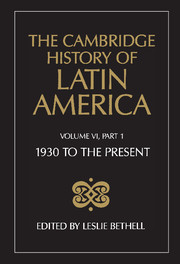7 - Economic ideas and ideologies in Latin America since 1930
from PART FOUR - ECONOMIC IDEAS
Published online by Cambridge University Press: 28 March 2008
Summary
The history of ideas in Latin America is typically confined to the description of regional adaptations of European ideas. However, in the field of economic ideas in the period from the Depression of the 1930s to the debt and growth crises of the 1980s, first ‘structuralism,’ associated with the U.N. Economic Commission for Latin America (ECLA, or in Spanish, CEPAL), and subsequently ‘dependency theory’ were notably autochthonous, distinctly Latin American contributions to development theory. Moreover, they were widely embraced by theorists and policy-makers in the Third World at large. Although Marxism is treated and corporatism is discussed in brief compass, it is to the development of structuralism and dependency - arguably the most influential ideas ever to appear in Latin America - that this essay is principally devoted. It deals with the diffusion of ideas, the formation of new ideas, and, necessarily, the independent rediscovery of ideas already developed elsewhere. Because they are sometimes inseparable in the Latin American context, it also occasionally treats policy as well as theory. The project is inherently a comparative one, since only by comparision can originality or distinctiveness be assessed. Genetic connections between ideas in Latin America and elsewhere will be indicated, as well as the independent rediscovery of identical or closely analogous propositions. Finally, in social thought, it seems obvious that theory, if its tenets are assumed to be true and are not subject to empirical verification, slips easily into ideology, a set of propositions which implicitly justifies social values or social configurations. Both theory and ideology are part of the story.
- Type
- Chapter
- Information
- The Cambridge History of Latin America , pp. 391 - 460Publisher: Cambridge University PressPrint publication year: 1995
References
- 8
- Cited by

